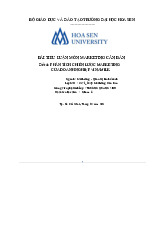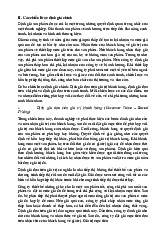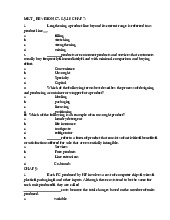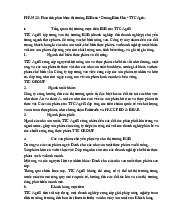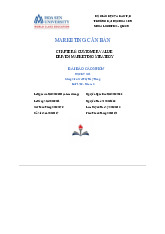




Preview text:
Good moring everyone, my name’s Tran. I’ll continue the presentation. In this
presentation I'll explore the major types of wholesalers and their marketing decision. Let's begin. Slide 27
In this section the content includes 4 main parts
11.4. Explain the major types of wholesalers and their marketing decisions
First I’ll talk about the “Wholesaling” Slide 28 -
Wholesaling: includes all the activities involved in selling goods and services to
those buying for resale or business use. -
Wholesalers: mean buy mostly from producers and sell mostly to retailers,
industrial consumers, and other wholesalers.
Wholesalers primarily buy from producers and sell to: retailers, industrial consumers, and other wholesalers
Slide 29 Types of wholesaler
About wholesalers, there are 4 types: merchant wholesalers, brokers, agents and
manufacturers’ and retailers’ branches and offices Slide 30
I’ll summarizes each types of wholesalers
Merchant wholesalers are the largest single group of wholesalers, accounting for
roughly 50 percent of all wholesaling. They include two broad types: full-service
wholesalers and limited-service wholesalers. Full-service wholesalers provide a full set
of services, whereas the various limited-service wholesalers offer fewer services to their suppliers and customers.
Brokers differ from merchant wholesalers in two ways. They do not take title to goods,
and second, they perform only a few functions. Like merchant wholesalers, they
generally specialize by product line or customer type. A broker brings buyers and sellers
together and assists in negotiations for which they earn a commission on the selling price.
Agents represent buyers or sellers on a more permanent basis. Manufacturers’ agents
(also called manufacturers’ representatives) are the most common type of agent
wholesaler. They perform only a few functions and do not take title to goods.
Another major type of wholesaling is that done in manufacturers’ and retailers’
branches and offices by sellers or buyers themselves rather than through independent wholesalers.
Slide 31 Type of full-service wholesalers (wholesale merchants)
This slide illustrates the two types of full-service wholesalers: wholesale merchants and industrial distributors.
Wholesale merchants sell primarily to retailers; and provide a full range of services;
General merchandise wholesalers carry several merchandise lines; whereas general
line wholesalers carry one or two lines in great depth And Specialty wholesalers
specialize in carrying only part of a line.
Slide 32 Type of full-service wholesalers (industrial distributors)
Industrial distributors sell to manufacturers rather than to retailers. They provide
several services, such as carrying stock, offering credit, and providing delivery, and they
may carry a broad range of merchandise, a general line, or a specialty line.
Slide 33 Types of limited-service wholesalers
This table shows the types of limited-service wholesalers.
Cash-and-carry wholesalers carry a limited line of fast-moving goods and sell to small
retailers for cash. They normally do not deliver.
Truck wholesalers (or truck jobbers) carry a limited line of semi-perishable
merchandise which is sold for cash as deliveries are made.
Drop shippers do not carry inventory or handle the product. On receiving an order,
drop shippers select a manufacturer, who then ships the merchandise directly to the
customer. Drop shippers operate in bulk industries.
Rack jobbers price the goods, keep them fresh, set up point-of-purchase displays, and keep inventory records.
Producers’ cooperatives are farmer-owned members that assemble farm produce for sale in local markets.
Mail-order or Web wholesalers send catalogs to or maintain Web sites for retail,
industrial, and institutional customers. Its primary customers are businesses in small outlying areas.
Slide 34 Type of manufacturers and retailers brenches and office
Separate branches and offices for manufacturers and retailers can be dedicated to either sales or purchasing.
Sales branches and offices are set up by manufacturers to improve inventory control, selling, and promotion.
Sales branches carry inventory and are found in industries such as lumber and
automotive equipment and parts.
Sales offices do not carry inventory and are most prominent in the dry goods and notions industries.
Purchasing offices perform a role similar to that of brokers or agents but are part of
the buyer’s organization./ Many retailers set up purchasing offices in major market
centers, such as New York and Chicago.
Slide 35 Types of agents
There are four types of agents.
Manufacturers’ agents represent two or more manufacturers of complementary lines.
They are hired by small manufacturers who cannot afford their own field sales forces
and by large manufacturers who use agents to open new territories or cover territories
that cannot support full-time salespeople.
Selling agents have contractual authority to sell a manufacturer’s entire output. The
selling agent serves as a sales department and has significant influence over prices,
terms, and conditions of sale. Found in product areas such as textiles, industrial
machinery and equipment, coal, chemicals, and metals.
Purchasing agents have a long-term relationship with buyers and make purchases for
them, often receiving, inspecting, warehousing, and shipping the merchandise to
buyers. Purchasing agents help clients obtain the best goods and prices available.
Commission merchants take physical possession of products and negotiate sales.
They are used in agricultural marketing by farmers who do not want to sell their own
output. They take a truckload of commodities to a central market, sell it for the best
price, deduct a commission and expenses, and remit the balance to the producers. Slide 36
As shown in this figure, wholesalers’ marketing decisions include choices of
segmentation and targeting, differentiation and positioning, and the marketing mix,
which is product and service assortments, price, promotion, and distribution. They can
choose a target group by size of customer, type of customer, the need for service, or other factors.
Like retailers, wholesalers must decide on product and service assortments, price,
promotion, and place. Wholesalers add customer value through the products and
services they offer. Price is an important wholesaler decision. Wholesalers usually mark
up the cost of goods by a standard percentage. Most wholesalers are not promotion
minded. Finally, distribution or location is important. Wholesalers must choose their
locations, facilities, and Web locations carefully. Slide 37
Today’s wholesalers face considerable challenges. The industry remains vulnerable to
one of its most enduring trends, the need for ever-greater efficiency. Recent economic
conditions have led to demands for even lower prices and the sorting out of suppliers
who are not adding value based on cost and quality.
The distinction between large retailers and large wholesalers continues to blur. Many
retailers now operate formats such as wholesale clubs and supercenters that perform
many wholesale functions. In return, some large wholesalers are setting up their own
retailing operations. The increased use of computerized, automated, and Internet-based
systems will help wholesalers contain the costs of ordering, shipping, and inventory
holding, thus boosting their productivity.
Slide 38 Case study - Costco
In this section, I’ll give you a case study about wholesale. Maybe everyone here knows Costco, right?
Costco Wholesale Corporation, or Costco, is an American multinational fashion brand
headquartered in Washington. Talking about Costco is talking about the convenience
and trust of every home, especially for women when shopping for their families and themselves.
Since its inception, Costco has had a total of 770 warehouses and stores worldwide
So what benefits does Costco bring to consumers that people trust to shop here?
Wide Product Selection: Find everything you need under one roof: groceries,
electronics, furniture, clothing, and more.
Bulk Purchasing Power: Save significantly with bulk quantities and wholesale prices for
families, businesses, and events.
Quality Assurance: Trusted brands and high standards ensure customer satisfaction.
Exclusive Membership Benefits: Access warehouses, discounts, Costco Travel, gas stations, and online shopping.
Customer Service: Knowledgeable staff ready to assist, answer questions, and make your experience enjoyable.
And that is the end of our presentation Slide 18
In this slide, we explored the key concepts related to wholesaling and wholesalers.
Here's a summary of the main points covered: Slide 39 (thank you)
Thank you for listening. We hope this presentation has provided valuable insights into
this important aspect of the business ecosystem.
Should you have any further questions or require additional information, please don't hesitate to reach out.
